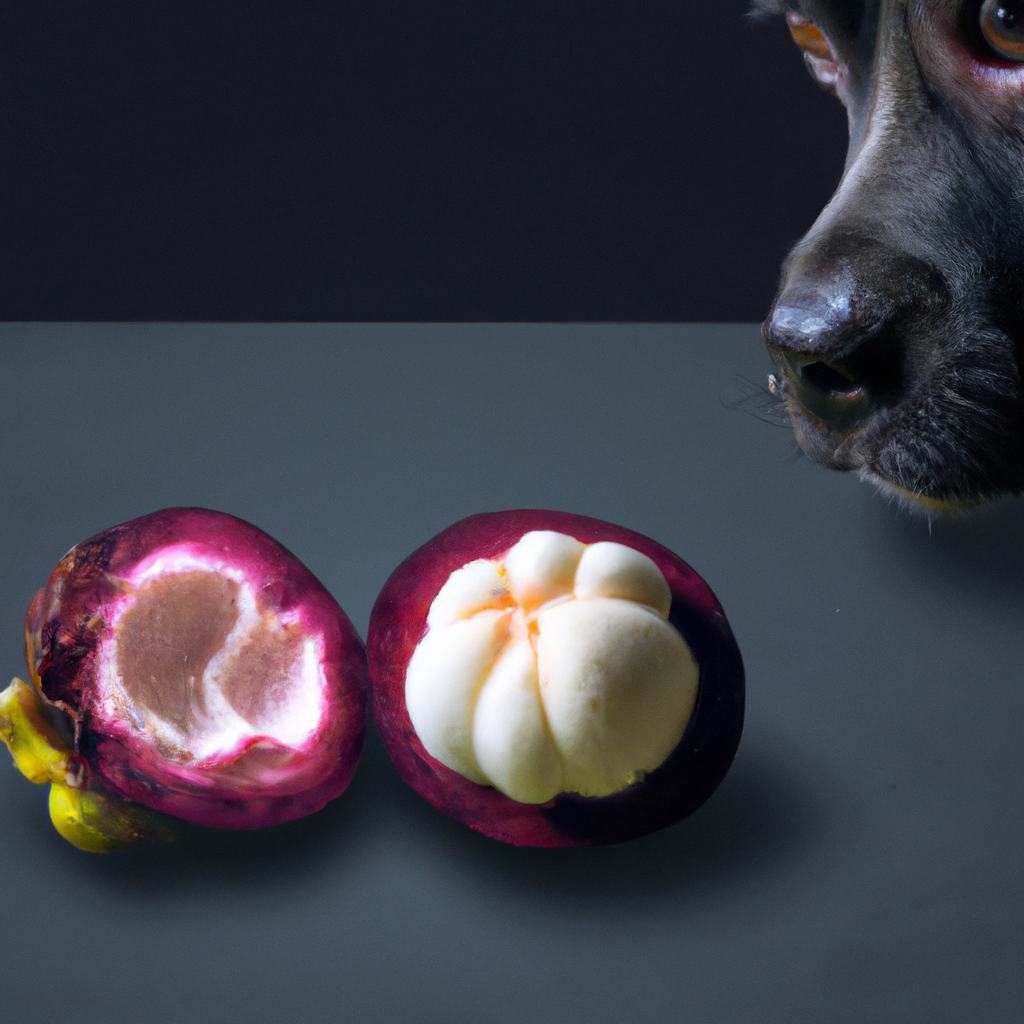Can Dogs Eat Mangosteen
Are you ready to unleash the power of mangosteen for your furry companion?
Discover the incredible benefits this exotic fruit can offer your dog’s health and well-being. From its rich nutritional profile to its potential anti-inflammatory properties, mangosteen might just become your secret weapon in promoting vitality and longevity for your canine companion.
But before you dive in, let’s explore the risks and precautions to ensure a safe and enjoyable experience.
Get ready to embark on a journey of canine nutrition like never before!
Key Takeaways
- Mangosteen has high nutritional value for dogs and is packed with vitamins, minerals, and antioxidants.
- It can improve skin health, promote healthy skin cell regeneration, and reduce the risk of skin issues like dryness, itching, and irritation.
- However, there are potential risks and precautions when feeding mangosteen to dogs, including potential allergies, digestive issues, and the need to introduce it gradually and in small quantities.
- There are alternative fruits for dogs that can provide similar benefits, such as pineapple, papaya, and pomegranate, but it is important to consult with a veterinarian before making any changes to the diet.
The Nutritional Value of Mangosteen for Dogs
You should know that mangosteen is a fruit with a high nutritional value for dogs. When it comes to the health benefits for your furry friend, mangosteen is a powerhouse. Packed with vitamins, minerals, and antioxidants, this fruit can contribute to your dog’s overall well-being.
Mangosteen contains essential nutrients like vitamin C, which boosts the immune system and helps fight off diseases. It also contains fiber, which aids in digestion and promotes a healthy gut. Additionally, mangosteen is rich in potassium, which supports heart health and regulates blood pressure.
When it comes to serving mangosteen to your dog, it’s important to consider the recommended serving size. While this fruit is beneficial for dogs, moderation is key. It’s best to start with small amounts and observe your dog’s reaction. A recommended serving size is around one to two slices of mangosteen per day, depending on the size of your dog. It’s crucial to remove the seeds before feeding, as they can pose a choking hazard.
Potential Benefits of Mangosteen for Canines
Mangosteen may provide various potential benefits for your furry friend. This exotic fruit isn’t only delicious but also packed with nutrients that can positively impact your dog’s skin and allergies.
Here are three key ways in which mangosteen can benefit your canine companion:
-
Improved Skin Health: Mangosteen contains high levels of antioxidants, such as xanthones, which can help combat oxidative stress and inflammation in your dog’s skin. These antioxidants may promote healthy skin cell regeneration and reduce the risk of skin issues, such as dryness, itching, and irritation.
-
Natural Remedy for Allergies: If your dog suffers from allergies, mangosteen may offer natural relief. The potent anti-inflammatory properties of mangosteen can help alleviate symptoms associated with allergic reactions, such as itching, redness, and swelling. Additionally, the fruit’s immune-boosting qualities may enhance your dog’s ability to fight off allergens.
-
Supports Overall Health: Alongside its skin-related benefits, mangosteen can contribute to your dog’s overall well-being. It’s rich in vitamins, minerals, and fiber, which can help maintain a healthy digestive system, boost the immune system, and support optimal organ function.
Incorporating mangosteen into your dog’s diet can be a powerful way to improve their skin health and combat allergies naturally. However, it’s essential to consult with your veterinarian before introducing any new food to your pet’s diet.
Risks and Precautions of Feeding Mangosteen to Dogs
Feeding your furry friend mangosteen without consulting a veterinarian first may pose potential risks and precautions. While mangosteen is generally safe for dogs to consume, it’s important to be aware of potential allergies and digestive issues that may arise.
As a responsible pet owner, it’s crucial to prioritize your dog’s well-being and take the necessary precautions before introducing any new food into their diet.
Mangosteen contains natural compounds that can trigger allergies in some dogs. These allergies may manifest as itching, skin rashes, or even more severe symptoms such as difficulty breathing. Therefore, it’s essential to monitor your dog closely after feeding them mangosteen for the first time. If you notice any adverse reactions, it’s crucial to discontinue feeding them this fruit and consult a veterinarian immediately.
Additionally, mangosteen has high fiber content, which can potentially lead to digestive issues in dogs. Some dogs may experience diarrhea, stomach discomfort, or even bloating after consuming mangosteen. It’s important to introduce this fruit gradually into your dog’s diet and in small quantities to minimize the risk of digestive upset.
How to Introduce Mangosteen Into Your Dog’s Diet
When introducing mangosteen into your dog’s diet, gradually incorporate small amounts to minimize the risk of digestive upset. Dogs can benefit from the addition of new fruits like mangosteen to their diet, as it provides a variety of health benefits. Here are three important things to keep in mind when introducing mangosteen to your dog:
-
Start with small quantities: Begin by offering your dog a small piece of mangosteen and observe their reaction. If your dog shows no signs of digestive upset, you can gradually increase the amount over time. This approach allows your dog’s digestive system to adjust to the new fruit.
-
Monitor for any adverse reactions: Keep a close eye on your dog after introducing mangosteen. Look out for any signs of stomach upset, such as diarrhea or vomiting. If you notice any negative reactions, discontinue feeding mangosteen to your dog and consult with your veterinarian.
-
Balance is key: While mangosteen offers numerous health benefits, it should be given as part of a balanced diet. Ensure that your dog’s overall diet consists of a variety of foods that meet their nutritional needs. Consult with your veterinarian to determine the appropriate portion size and frequency of mangosteen in your dog’s diet.
Alternative Fruits for Dogs: Exploring Other Safe Options
To explore other safe options, you can introduce a variety of fruits into your dog’s diet. While mangosteen may not be suitable for dogs, there are plenty of other exotic fruits that can provide a nutritious boost to your furry friend’s health. Understanding the digestive system of canines is crucial when selecting fruits for their diet.
Pineapple is a delicious and safe choice for dogs. It’s packed with vitamins, minerals, and enzymes that aid in digestion and boost the immune system. The natural sugars in pineapple provide a quick energy boost for your four-legged companion.
Another fruit to consider is papaya. It contains an enzyme called papain, which helps break down proteins and aids in digestion. Papaya is also rich in vitamins A, C, and E, which promote healthy skin and coat.
If you want to introduce a more unique fruit, try feeding your dog some pomegranate. Packed with antioxidants, pomegranate can help fight inflammation and boost heart health. Just make sure to remove the seeds before giving it to your dog, as they can be a choking hazard.
Remember, when introducing any new food to your dog, start with small amounts and monitor their response. Always consult with your veterinarian before making any significant changes to their diet.
Frequently Asked Questions
Are There Any Specific Breeds of Dogs That Should Not Eat Mangosteen?
Breeds prone to food allergies or with specific health conditions should avoid mangosteen. It’s important to consult a veterinarian to understand potential health risks for certain breeds before introducing new foods into their diet.
Can Dogs Eat the Seeds of a Mangosteen?
Dogs can eat mangosteen seeds, but there are potential risks. While mangosteen is generally safe for dogs, some may experience digestive issues or allergic reactions. Consult a vet, especially if your dog has health conditions.
Is It Safe to Feed Mangosteen to Puppies?
Feeding mangosteen to puppies can have potential health benefits, but there are risks and considerations to keep in mind. Always consult with a veterinarian before introducing any new food into your puppy’s diet.
Can Mangosteen Cause Any Allergic Reactions in Dogs?
Mangosteen can be harmful to dogs with food allergies. It can potentially cause allergic reactions and have side effects. As an authority, it is important to be aware of the potential risks before feeding mangosteen to your dog.
How Much Mangosteen Should I Feed My Dog?
When it comes to feeding your dog mangosteen, it’s important to know the recommended serving size. As an experienced authority, I can tell you that a small amount can provide potential health benefits.
Conclusion
In conclusion, while mangosteen can offer numerous potential benefits for dogs, it’s important to exercise caution and consider the risks involved.
The nutritional value of mangosteen can be beneficial for your canine companion, but it’s crucial to introduce it into their diet gradually and in moderation.
As an experienced dog owner, you’ve the knowledge and authority to make informed decisions about your pet’s diet.
Remember to explore other safe fruit options that can provide similar benefits for your furry friend.

If Richie Bedard is a dog food expert, author, or any other figure in the field of dog nutrition that emerged after September 2021,






